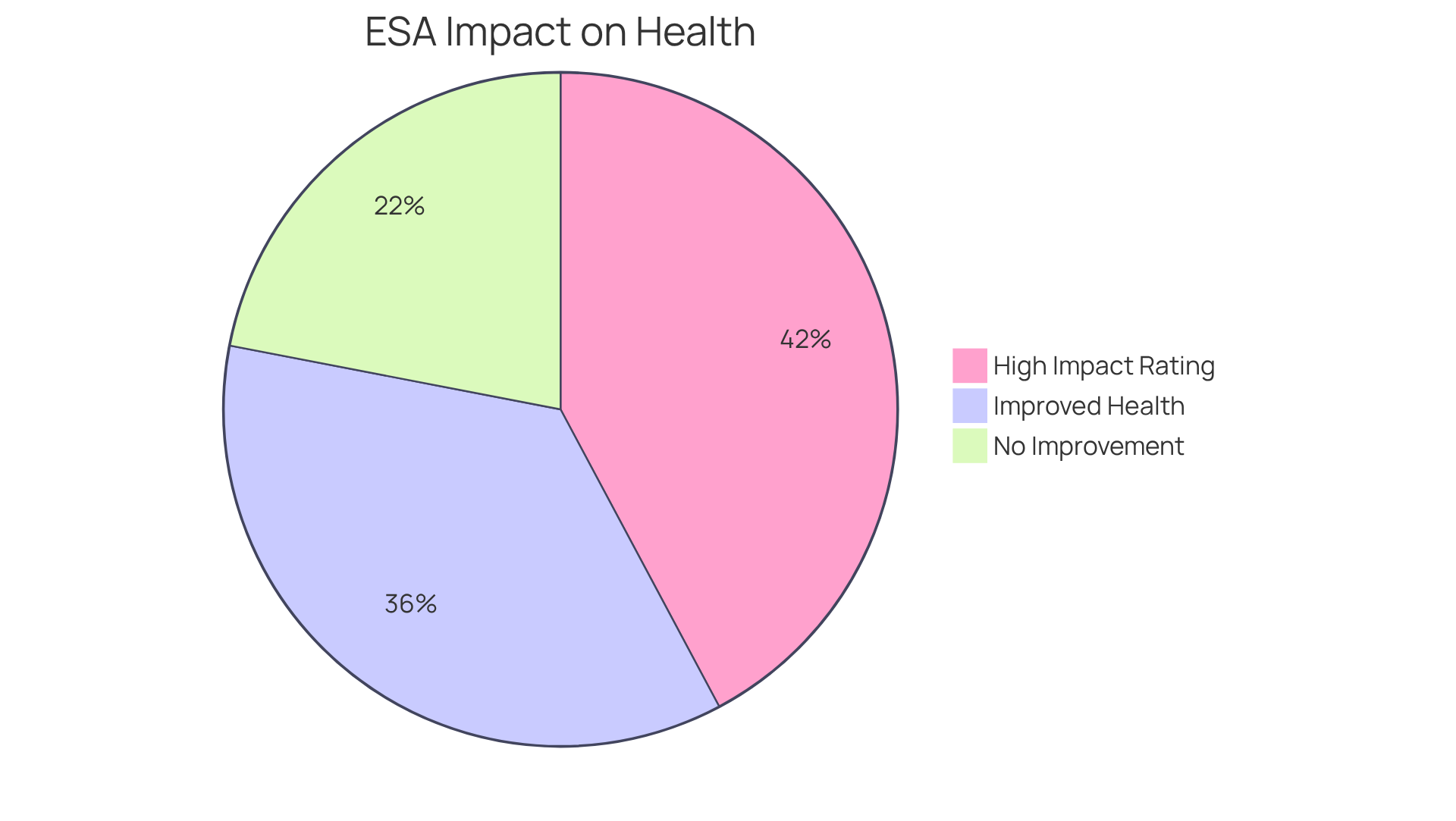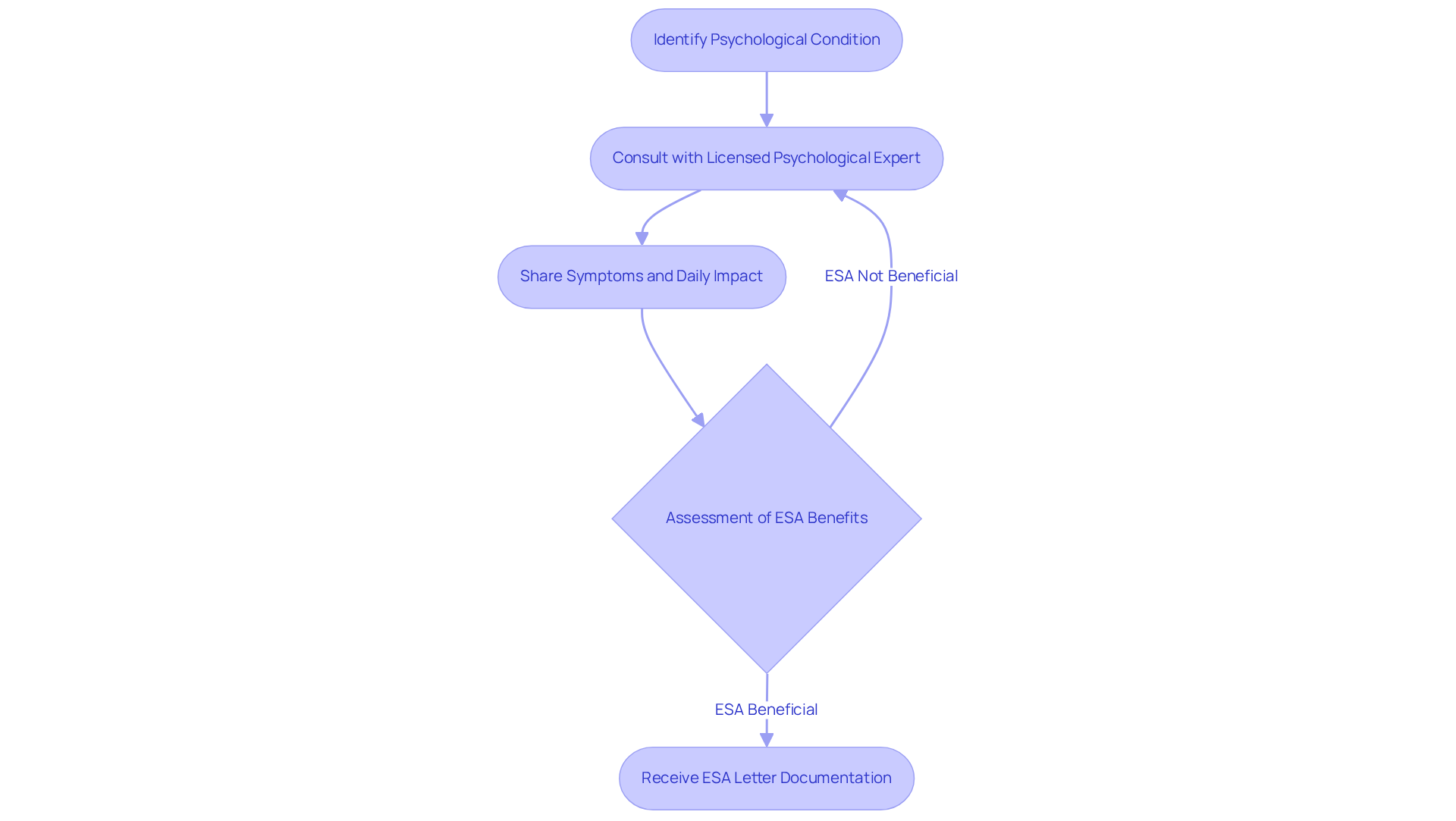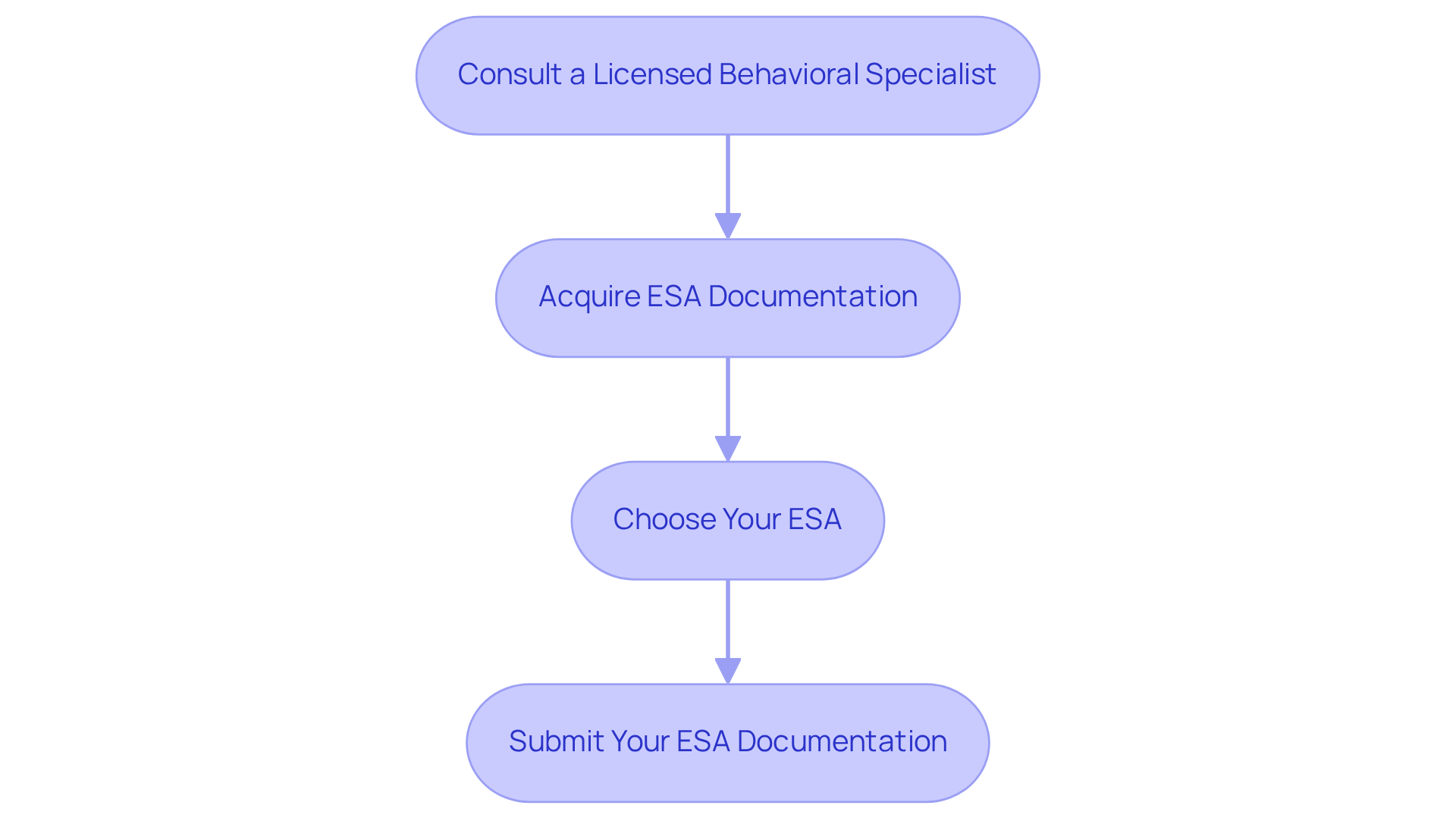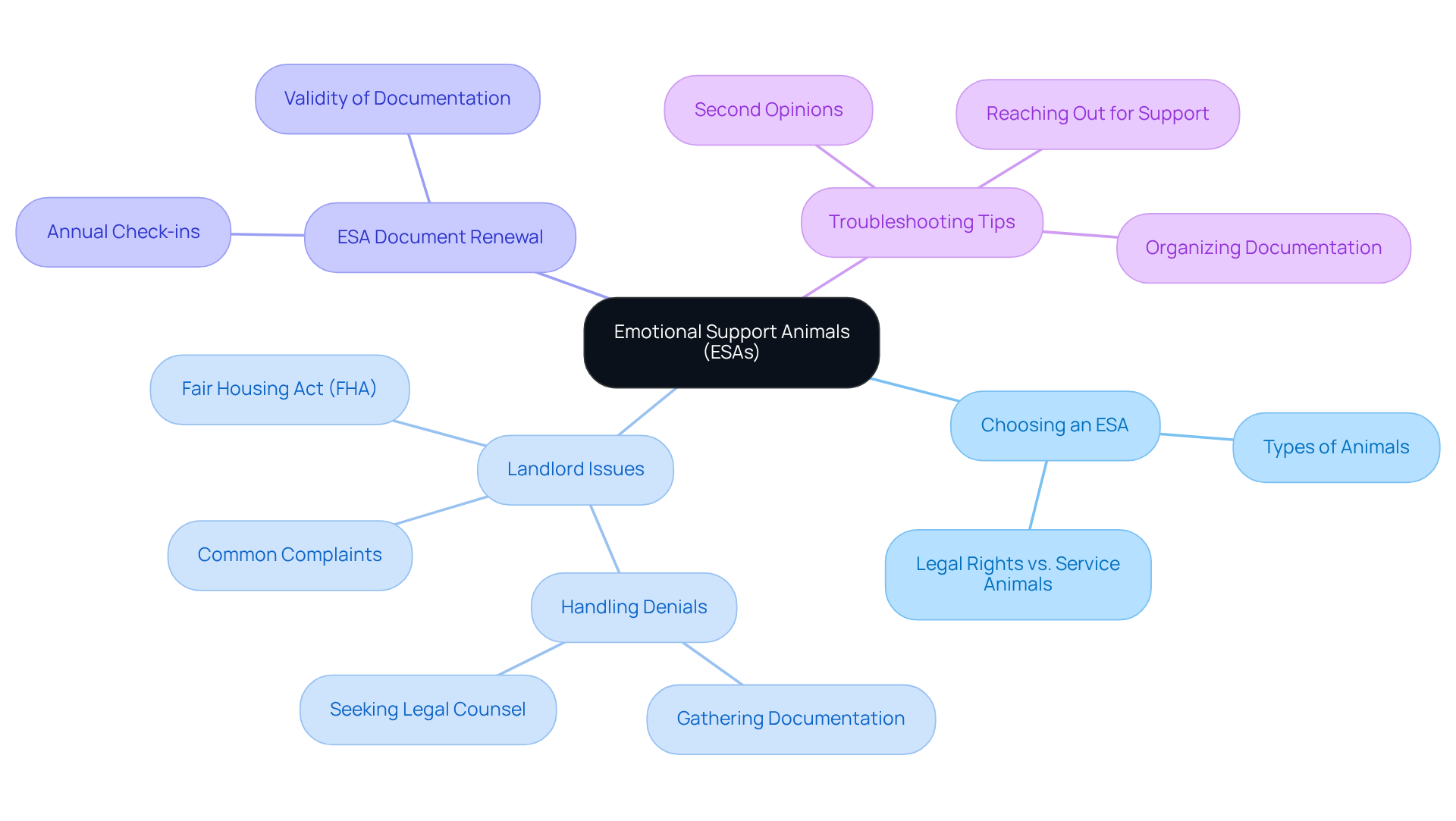

4 Steps on How to Get an Emotional Support Animal Letter for Free
by Lena Park
Last updated: August 14, 2025
Verified and Approved by:
Angela Morris,
MSW, LCSW
Fact Checked

Overview
Obtaining an Emotional Support Animal (ESA) letter for free can be a vital step for individuals facing emotional challenges. This process involves four key steps:
- Consulting a licensed mental health professional
- Acquiring the necessary documentation
- Selecting an appropriate ESA
- Submitting the documentation to relevant authorities
Many individuals struggle with mental health issues, feeling overwhelmed and isolated. The structured approach of obtaining an ESA letter not only provides legal recognition of the ESA’s role in supporting mental health but also opens doors to essential housing and travel accommodations under the Fair Housing Act. By following these steps, individuals can find the support they need, fostering a sense of connection and comfort in their lives. Remember, you are not alone in this journey; support is available to help you every step of the way.
Introduction
Emotional Support Animals (ESAs) hold a significant place in the hearts of many individuals who encounter emotional and psychological challenges, providing comfort and stability during difficult times. It’s crucial to understand the process of obtaining an ESA letter for free, as this documentation not only validates the profound bond between a person and their animal but also opens doors to essential housing and travel accommodations. Yet, the journey through the complexities of eligibility and the application process can feel overwhelming—what steps can you take to ensure you secure this vital support? Your emotional well-being matters, and knowing that there is a path to obtaining an ESA can bring hope and reassurance.
Understand Emotional Support Animals and Their Purpose
Emotional Support Animals (ESAs) are more than just pets; they are vital companions for individuals navigating emotional or psychological challenges, providing a source of comfort and stability. While service animals are specifically trained to perform tasks for those with disabilities, ESAs focus primarily on offering emotional support. This distinction is crucial, as it highlights the unique role ESAs play in alleviating symptoms of anxiety, depression, PTSD, and other psychological conditions.
The importance of knowing how to get an emotional support animal letter for free cannot be overstated. This letter serves as a formal acknowledgment of how to get an emotional support animal letter for free, which highlights the animal’s role in supporting the owner’s psychological needs and facilitates access to housing and travel arrangements. For example, under the Fair Housing Act, individuals facing psychological or emotional challenges can request reasonable accommodations for their ESAs, even within no-pets policies. This legal protection ensures that individuals can enjoy the companionship of their animals without facing unnecessary restrictions.
Recent studies shed light on the positive effects of ESAs on psychological well-being. A survey revealed that:
- 62% of ESA owners experienced improvements in their emotional health during the COVID-19 pandemic, compared to just 19% of those without an ESA.
- 73% of ESA owners rated their pets’ impact on their well-being as eight or higher on a scale of one to ten.
These findings resonate with expert opinions that underscore the role of ESAs in alleviating anxiety and depression, particularly for those with PTSD. Real-world stories illustrate how ESAs provide essential emotional support, helping individuals manage the challenges of their psychological conditions and enhancing their overall quality of life.

Determine Eligibility for an ESA Letter
To be eligible for an Emotional Support Animal (ESA) letter, individuals must navigate the complexities of a diagnosed psychological condition that significantly impacts their daily life. Many face emotional challenges, with common conditions such as:
- Anxiety disorders
- Major depressive disorder
- Post-traumatic stress disorder (PTSD)
- Other emotional disorders
It’s important to recognize that these conditions affect millions, with anxiety disorders alone impacting approximately 40 million adults in the U.S. each year.
The journey begins with a heartfelt conversation with a licensed psychological expert who can truly understand your circumstances. During this assessment, it’s vital to share your symptoms and how they influence your daily functioning. Certified experts emphasize the importance of this assessment, as they can determine whether an ESA would be beneficial for your emotional well-being. If they find that an ESA is the right fit for you, they will provide the necessary documentation regarding how to get an emotional support animal letter for free to support your application.
Understanding that a legitimate psychological condition is essential for eligibility is crucial, as it ensures that the ESA serves a therapeutic purpose. This documentation not only opens doors to housing and travel accommodations but also reinforces the invaluable role of ESAs in enhancing emotional well-being. By addressing these needs, individuals can significantly improve their quality of life through the companionship of their emotional support animals. Remember, you are not alone in this journey; support is available to help you through.

Follow the Step-by-Step Process to Obtain Your ESA Letter
-
Consult a Licensed Behavioral Specialist: Begin your journey by meeting with a licensed therapist or psychiatrist who can truly understand your psychological needs. It’s important to share your symptoms openly and discuss how they affect your daily life. Mental wellness professionals, such as psychologists and licensed counselors, are equipped to evaluate whether an emotional support animal (ESA) could be beneficial for you. Remember, these experts are there to listen and support you, focusing on your situation rather than requiring you to ‘prove’ anything.
-
Acquire documentation on how to get an emotional support animal letter for free: If your mental health professional believes that an ESA might help, kindly request an official document that outlines your diagnosis and recommends an ESA. This important document should be on official letterhead and include the professional’s license number and contact details. Having proper documentation is crucial, as it serves as legal proof of your need for an ESA, ensuring that you can navigate housing regulations under the Fair Housing Act with ease.
-
Choose Your ESA: Take your time to select a pet that brings you comfort and emotional support. While dogs and cats are the most common companions, remember that any domesticated animal can qualify as an ESA. The key is that your chosen animal provides you with companionship and comfort, which can significantly alleviate symptoms of psychological conditions like anxiety and depression.
-
Submit Your ESA Documentation: Once you have your ESA documentation, present it to landlords or airlines as necessary. Be sure to keep a copy for your own records. If you encounter any challenges, such as a landlord denying your request, don’t hesitate to reach out to your mental health professional for additional support. Recent changes in the application process have made it easier than ever for individuals to learn how to get an emotional support animal letter for free, with many successfully receiving their paperwork through licensed professionals in just a few weeks. This streamlined approach has led to higher success rates in securing ESA documentation, highlighting the importance of working with qualified providers who truly care about your well-being.

Address Common Questions and Troubleshoot Potential Issues
Address Common Questions and Troubleshoot Potential Issues
Can I get an ESA letter for any pet?: While various pets can indeed serve as emotional support animals, it’s essential to choose a domesticated animal that you can care for adequately and that brings you comfort. Dogs and cats are common choices, known for their companionship and their ability to alleviate stress. It’s important to understand that emotional support animals (ESAs) differ from service dogs, which are specifically trained to perform tasks. ESAs provide emotional comfort, yet they do not possess the same legal rights and access to public spaces as service dogs under the ADA.
What if my landlord denies my ESA documentation?: If your landlord denies your ESA documentation, it’s vital to reference the Fair Housing Act (FHA), which protects your right to have an ESA in pet-restricted housing. The FHA stipulates that landlords cannot impose additional fees for ESAs or refuse accommodation without valid reasons. In fact, approximately 60% of complaints against housing providers concern disability access and the refusal of reasonable accommodations. If necessary, gathering additional documentation from your mental health professional or seeking legal counsel can strengthen your position. Often, disputes arise from landlords misunderstanding their obligations, so being well-informed can empower you to advocate for your rights effectively.
How often do I need to renew my ESA document?: ESA documents typically do not have an expiration date; however, it’s advisable to check in with your mental health specialist annually to confirm your ongoing eligibility. Regular check-ins can help ensure that your needs are being met and that your documentation remains valid.
Troubleshooting Tips:
- If you feel your mental health professional is not supportive, consider seeking a second opinion to ensure you receive the necessary guidance.
- Keep all documentation organized and accessible, including your ESA letter, any correspondence with landlords, and additional medical documentation. This organization will be crucial when presenting your case to landlords or during travel.
- If you encounter challenges with housing or travel, reach out to organizations that advocate for ESA rights for additional support and resources.

Conclusion
Emotional Support Animals (ESAs) hold a significant place in nurturing the emotional well-being of individuals grappling with psychological challenges. For those seeking the companionship and comfort that these animals offer, understanding how to obtain an ESA letter for free is a vital step. This process not only opens doors to housing and travel accommodations but also reinforces the therapeutic value of having an ESA in one’s life.
Many individuals face emotional struggles that can feel overwhelming. The journey to securing an ESA letter can be a beacon of hope, illuminating the path toward healing and support. The article outlines a clear four-step process to obtain an ESA letter:
- Consulting a licensed behavioral specialist
- Acquiring the necessary documentation
- Selecting an appropriate ESA
- Submitting the documentation to relevant parties
Each step is designed with care, ensuring that individuals receive the support they need while navigating the complexities of mental health and housing regulations. Addressing common questions and potential issues further empowers readers, equipping them with the knowledge to advocate for their rights effectively.
Ultimately, recognizing the profound impact that emotional support animals can have on mental health is essential. By taking these steps, individuals not only gain access to the companionship of an ESA but also empower themselves to enhance their quality of life. It’s important to remember that support is available, and the benefits of having an emotional support animal can lead to a more fulfilling and balanced life. As you reflect on your own experiences, consider how an ESA might bring comfort and companionship into your life, reminding you that you are not alone on this journey.
Frequently Asked Questions
What are Emotional Support Animals (ESAs)?
Emotional Support Animals (ESAs) are companions for individuals facing emotional or psychological challenges, providing comfort and stability. Unlike service animals, ESAs are not trained to perform specific tasks but focus on offering emotional support.
How do ESAs differ from service animals?
ESAs primarily provide emotional support to individuals with psychological conditions, while service animals are specifically trained to perform tasks for individuals with disabilities.
Why is it important to obtain an emotional support animal letter?
An emotional support animal letter formally acknowledges the animal’s role in supporting the owner’s psychological needs and facilitates access to housing and travel arrangements, ensuring legal protections under laws like the Fair Housing Act.
What legal protections do ESAs have under the Fair Housing Act?
The Fair Housing Act allows individuals with psychological or emotional challenges to request reasonable accommodations for their ESAs, even in no-pets policies, enabling them to live with their animals without facing unnecessary restrictions.
What positive effects do ESAs have on psychological well-being?
Studies show that ESAs can significantly improve emotional health. For instance, a survey indicated that 62% of ESA owners experienced emotional health improvements during the COVID-19 pandemic, and 73% rated their pets’ impact on their well-being as eight or higher on a scale of one to ten.
How do experts view the role of ESAs in mental health?
Experts emphasize the importance of ESAs in alleviating symptoms of anxiety and depression, particularly for individuals with PTSD, highlighting their essential role in enhancing overall quality of life.
Certify Your Emotional Support Animal Today

Why You Can Rely on Us?
At Wellness Wag, we believe your pet deserves care rooted in both science and compassion. Each article is carefully researched, written in clear language for pet owners, and then reviewed by qualified professionals to ensure the information is evidence-based, current, and practical for real-life care. Our goal is to help you feel confident in making informed decisions about your pet’s health and well-being.
Reviewed by
Angela Morris, MSW, LCSW
Angela is a licensed clinical social worker with 20 years of experience in patient advocacy and community mental health. She has assisted numerous clients with ESA evaluations and brings a deep understanding of disability accommodations, ensuring that all information is accurate, supportive, and practical.

Written by :
Lena Park
Last Updated :
August 14, 2025












